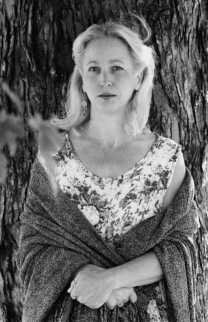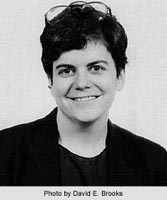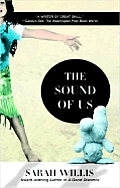Author2Author: Sarah Willis & Maureen McHugh
I’m afraid that I’ve been sitting on this transcript of the Author2Author exchange between Maureen McHugh and Sarah Willis for way too long—between going on that festival tour, then trying to relaunch a column as soon as I got back. But enough of my excuses, let’s just get right to the dialogue, and discover what makes this pair of writers such a good fit.
 Sarah Willis: I was thinking about how we met at the Cajun Sushi Hamsters (a Cleveland science fiction writer’s group), and what a wild experience that was with some 22 members critiquing my first attempt at a novel, a 400-page SF story with a neuropsychiatrist as a narrator. (What was I thinking??) It didn’t take me too long to figure out that what I write best is more mainstream, and I left the group and started a writer’s group with just a few people that met at my house once a month. I didn’t know you very well then, and when you asked to join our group I was both surprised and a little terrified.
Sarah Willis: I was thinking about how we met at the Cajun Sushi Hamsters (a Cleveland science fiction writer’s group), and what a wild experience that was with some 22 members critiquing my first attempt at a novel, a 400-page SF story with a neuropsychiatrist as a narrator. (What was I thinking??) It didn’t take me too long to figure out that what I write best is more mainstream, and I left the group and started a writer’s group with just a few people that met at my house once a month. I didn’t know you very well then, and when you asked to join our group I was both surprised and a little terrified.
You were a real writer with published short stories and an award winning novel, China Mountain Zhang. I had, at that time, published one short story, and was frankly in awe of you. I thought you’d upset the apple cart. You’ve been in our group, what, thirteen years now? I can’t even imagine it without you. So here’s the question: Why did you want to be in both writer’s groups, and how does a writer’s group help you?

Maureen McHugh: Sarah, the fact that you were nervous surprises me. I thought I was writing genre fiction and you were writing the real thing. You had this spare, beautiful way with prose. Funny how we see ourselves versus how others see us. I wasn’t at all surprised when you left the Cajun Sushi Hamsters because while they’re a great group, they seemed interested in different things than your fiction. I guess I felt as if I had a foot in both camps. I wrote stuff that was ostensibly genre, but I’d studied fiction writing at New York University under writers like Robert Stone, Alyx Kates Shulman and Edmund White.
I feel tremendous loyalty to the Hamsters and to the East Side Writers. I guess I’m in two writer’s groups because I felt so strongly that I was suspended between genre and non-genre fiction. That was before slipstream was what it is today, before people like Michael Chabon and Suzanna Clarke and Jonathan Lethem were writing across what felt to me to be very difficult barriers. Now I feel as if what the two groups have is not so much genre/non-genre as just different sensibilities. On the rare occasion I’ve had a story critiqued by both groups, their takes were often extremely different. I don’t think one was right and the other wrong, just that they offered different perspectives on the story.
I think writer’s groups, like cities and people, have personalities. Now I’d hate to give one up because I genuinely like them both.
One of the things I’m just coming to in the last couple of years is writing about Ohio, about family and about the suburbs where I grew up and now have moved back to. Your writing always seems so grounded in specific places, and places that are personal to you. You do research, I know, particularly historical research but also the kind of research you did with social services for The Sound of Us. Could you ever set a story in New York City, or a farm in Mississippi, or someplace you were less familiar with? Do you start with the place when you write? (It worked for William Faulkner…)
>
 Sarah Willis: Well, yes, I have based characters on people I know, but I’m doing that less and less, doing what you do now, taking a gesture, or a way of speaking, or a bad habit, or a good habit from people I know and adding these things to the characters I’m making up. But with my first book, Some Things That Stay, I even used some real people’s names, like the Burns, who were friends of my family and did rent us a farm house where they left us the dog and cows for the summer. They were wonderful people, great characters, and I wanted to write about them. It never really occurred to me that the novel would get published, and when the editor at FSG bought it, it was a little too late to ask him to change the names. Actually, if he reads this, it will be a bit of a surprise to him. But they were dead, and I treated them lovingly. Still, I wouldn’t do that again. I did make up the part about their son dying of leukemia. They didn’t even have a son, but did have two daughters. I ran into one daughter at a book signing and she thought it was all fine, except she said, “There wasn’t a bathroom on the second floor.” I told her that I made that part up.
Sarah Willis: Well, yes, I have based characters on people I know, but I’m doing that less and less, doing what you do now, taking a gesture, or a way of speaking, or a bad habit, or a good habit from people I know and adding these things to the characters I’m making up. But with my first book, Some Things That Stay, I even used some real people’s names, like the Burns, who were friends of my family and did rent us a farm house where they left us the dog and cows for the summer. They were wonderful people, great characters, and I wanted to write about them. It never really occurred to me that the novel would get published, and when the editor at FSG bought it, it was a little too late to ask him to change the names. Actually, if he reads this, it will be a bit of a surprise to him. But they were dead, and I treated them lovingly. Still, I wouldn’t do that again. I did make up the part about their son dying of leukemia. They didn’t even have a son, but did have two daughters. I ran into one daughter at a book signing and she thought it was all fine, except she said, “There wasn’t a bathroom on the second floor.” I told her that I made that part up.
For The Rehearsal, I was writing about actors. I grew up in the theatre, at the Cleveland Play House where my father was an actor and director, so I knew many, many actors. I didn’t base any character on any one actor, but I did use traits and sensitivities and idiosyncrasies of several of the actors, and created new characters from that. In A Good Distance, I used my mother’s time-line for the character of Rose, then asked my mother about the things that she did when she was six, or twelve, or nineteen, etc. The character of Rose is not my mother, but I did use a few wonderful details of my mother’s life, such as the fact that she was the first female president of the student council at her high school, and a star swimmer, and avid about politics.
As a matter of fact, one of the things I told myself I would do with my novel, The Sound of Us was to completely make up every character from scratch, but guess what? That’s impossible, at least for me. All sorts of little things about myself slipped in there, and people I know. I won’t say what, though. I guess I’m getting a little more secretive in my old age.
Someone in our writer’s group warned me not to use names of people I know, that it throws a reader that knows me out of the story and into reality, but so much of what I write might do that for anyone that knows me well. But the same person has given me great advice in other areas. (He’s the one that never lets me get away with sappy or lazy writing, and I owe him a great deal of thanks for that.) Can you say what kinds of comments have helped you from our group, and how you deal with hearing your stories critiqued by nine other writers?
Maureen McHugh: Working with a critique group is actually good training for writing for freelance. One of the things that I have to learn and learn again from comments from the writer’s group is to let go of a kind of ownership of my writing. A writing teacher once said that the first draft is for the writer, the second draft is for the reader. It’s not that clean for me (for one thing, at some level, all the drafts are for me, you know?) but when our writer’s group makes comments, it lets me see the ways in which readers are not me.
I don’t always deal very well with having my stories critiqued. I get mad. I get hurt. Oddly enough, the better the critique, the more likely it is I’ll react emotionally to it. Because of course, the better the critique, the more likely it is to really hit my soft spots, and the less defense I have against it. So then I have to go home, nurse my wounds a bit, and then really start changing the manuscript. I have a rule, when three people comment on the same piece of text, there’s a problem. Sometimes even our writer’s group can’t actually identify the problem. In one of my books, you and a number of others in the group said that a scene which should have been really emotional–a girl watching her father killed–wasn’t. All of you said that sentence by sentence the writing was good, and I remember you saying, maybe it should be longer. And people around the circle nodded. Who doesn’t love being told to make something longer? I let it sit for a couple of months while I went on with the novel. Then I came back to it and really looked at it, I ended up making it shorter and used some of the techniques of poetry–more metaphorical and startling language. And it made all the difference. Everyone was right, the prose wasn’t working. And maybe writing longer would have solved the problem, too. But the thing was, the group showed me where to work. The hardest thing anyone has ever said to me in critique was “Why do you write this?” That has been a painful, but oddly useful question. I can’t explain why it was so useful, but it was.
What are you working on now?
Sarah Willis: I’m trying an omniscient voice, a voice I love to read but haven’t written in except for very short pieces. It’s hard to sustain. I tend to write very short, spare sentences in first person. I want to write longer sentences. I know that sounds like a odd way to approach a novel, and it’s not the only thing I’m concentrating on, but what I want to do is find a new voice, a new way of telling a story, a slower pace in some way, and in some ways, more luxurious. I’m also inventing a town. My first two novels took place in Mayville, NY, and my second two took place mostly in Cleveland. I like to start in a place I know, and invent from there–the characters, the situation. Now I want to invent the place, and since I start with place, that’s where I’m starting now, working on the town, the layout, the people in it. Those people are starting to do interesting things, and I’m watching them, seeing who speaks up. I’m finding this a slower way of writing than my other novels. I imagine it will take me a while. Meanwhile, I keep writing short pieces. I have a short-short coming out in the Tampa Review, a few poems in Whiskey Island&8212;yes, I’m following in your footsteps again; I know that you’re getting poetry published, too, and I got jealous—and I have a short story just published on Amazon Shorts, called “Air Conditioners.”
And I’m going to college now, for my MFA!!! So I have homework! I sat on the floor in the hallway yesterday waiting for the teacher. Very strange. I’m too old for this, my body shouts, but my mind says “More!”
26 October 2005 | author2author |


 Our Endless and Proper Work is my new book with Belt Publishing about starting (and sticking to) a productive writing practice.
Our Endless and Proper Work is my new book with Belt Publishing about starting (and sticking to) a productive writing practice. 
